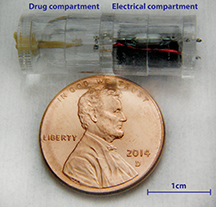 |
| "Smart" capsule under development--Courtesy Purdue University/Babak Ziaie |
Purdue University researchers are developing a "smart" capsule to deliver drugs directly to the large intestine, bypassing the stomach and small intestine. It could have application to the treatment of irritable bowel syndrome, Crohn's disease and fighting the life-threatening bacteria Clostridium difficile, all conditions that affect the large intestine.
"Usually, when you take medication it is absorbed in the stomach and small intestine before making it to the large intestine," said Purdue professor of electrical and computer engineering Babak Ziaie in a university news release. "However, there are many medications that you would like to deliver specifically to the large intestine, and a smart capsule is an ideal targeted-delivery vehicle for this."
About the width of a penny, the capsule contains a drug and electrical component. It's powered by a capacitor that's charged before each use. A wearable magnet that can be worn around the patient's waist activates the smart capsule just before the small and large intestines meet, causing the device to open up and release the drug into the large intestine.
"It takes up to 12 hours to get to the large intestine, so we wanted to make sure the smart capsule can withstand conditions in the gastrointestinal tract," Ziaie said in the news release.
Currently, people with C. difficile infections are treated via fecal transplants that contain crucial microbes, Purdue says. But the team members believe the smart capsules can be used to deliver them in a powdered, freeze-dried state.
The researchers have filed a patent through Purdue's Office of Technology Commercialization of the Purdue Research Foundation. Additional research continues at Purdue's Birck Nanotechnology Center and may involve human patients, the news release says.
- read the university news release